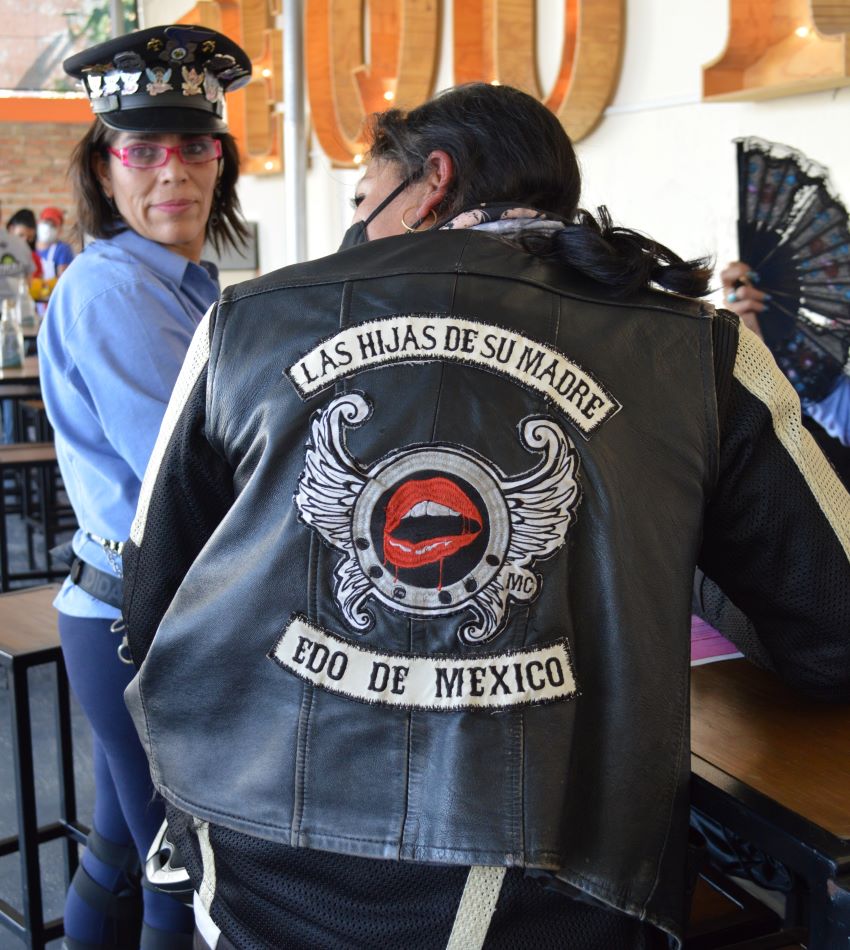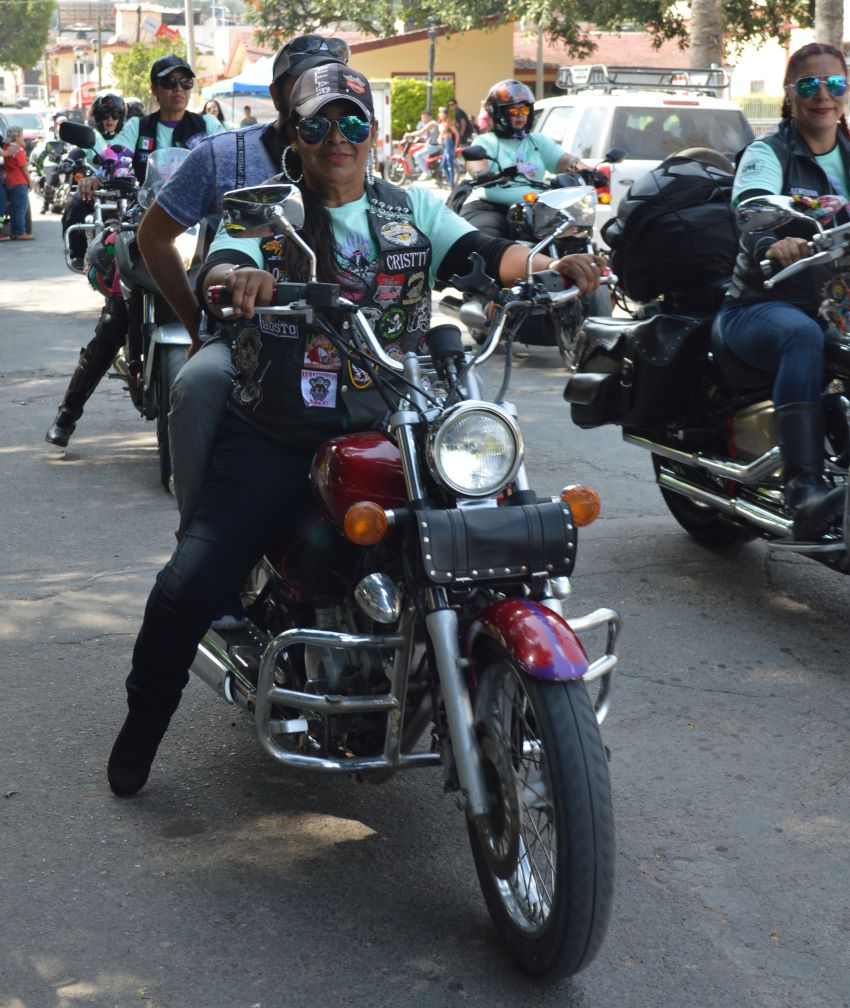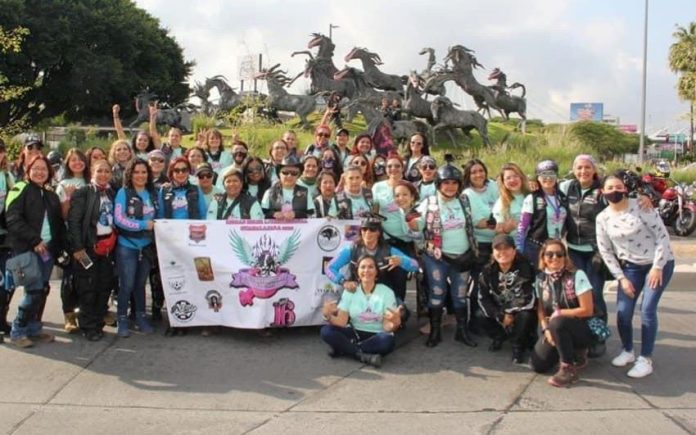Over the past decade, bikers mexicanas have been creating groups and events to get women beyond just looking at motorcycles and actually riding them.
Their goal is a daunting one: as of 2019, only 20% of Mexico’s motorcyclists were women, compared to 35% in the rest of the world. As late as in the 1980s, it was not acceptable for a woman to ride her own bike. Even 20 years ago it was difficult for a women rider to join a club or a group ride. Women riders today are still considered a novelty, says Yoly Chopper, a lawyer from Guadalajara.
But things are getting better.
Today, there are still some clubs that forbid women, but now they are rare. And while women who announce to nonriding families that they want a motorcycle still face some resistance, this often passes with time. Chopper got her first bike in her 40s, and her family was worried for her safety. Ten years later, not only do they accept her passion but now “Mamá es cool.” More men support women bikers, even performing security and logistics for women’s events.
Women riders in Mexico include professional riders, politicians, businesswomen, career professionals, housewives and manual laborers. They are daughters, mothers and even grandmothers. Some have gained a reputation nationally. Astrid Madrigal is the queen of motocross in Mexico despite her youth. At 70+ years of age, Barbie Biker of Torreón is a legend for roadsters.

It has not always been this way, however.
Culturally, it can be difficult for women riders because of longstanding assumptions that motorcycling is only for men, with women relegated to the back seat as the mochila (backpack) or nalgitas (rear end or buns). Of course, this problem is not limited to Mexico. Objections here are much the same as in other parts of the world — that it is too dangerous, that women cannot handle the physical demands of riding or even that the novelty of seeing a women rider might cause road accidents.
Interestingly, it is often mothers who try to block the way. Sally Mayer of Querétaro recalls that when she bought her first bike, her mother said, “Better to buy a pistol than a bike because it is faster [to get killed].” Some women said they waited until they were older, and others found ways to have a motorcycle without their mothers knowing.
At traditional biker events, which overwhelmingly cater to men, it’s easy for women bikers to feel excluded. Most of the women there are hangers-on with no knowledge of riding or maintenance. The T-shirts and other paraphernalia sold at these events are not offered in either designs or sizes adequate for women.
But the growth of women’s clubs and events is giving female riders their own friendlier space. One of the first was the Orquídeas Motorcycle Club in Mexico City. It began with eight women in 2005. Two of the founders, Liliana and Lucero Urbina, still coordinate the club. There are also national-level clubs with chapters in various parts of the country, such as the Amazonas and Mujeres Bikers International. There is also the Pochianchis, a local club in the small community of San Francisco del Rincón, Guanajuato, named after a trio of infamous sisters who ran bars and brothels there.
The most important all-female biker event is Chicas Biker, held each year in October. The event consists of meeting in Guadalajara, then riding to a rural location for a weekend of camping and camaraderie. In 2019, the event welcomed over 250 women from all over Mexico and even the U.S., Europe and Latin America. (The 2020 event was limited to only 80 due to Covid-19.) According to founder Anayancin Y. “Yancy” Fierros Viveros, one of the event’s main successes is that nonriding women who tag along come back the following year with their own bike.

This technical and emotional support is crucial for most female novices to take the plunge. Women like Arlen García of Mexico City tell stories of liking motorcycles for a long time but not acting on it until becoming friends with a rider who offered to mentor.
Women find their way to motorcycles much the way men do. Mayer says her introduction was through watching Elvis Presley and Marlon Brando movies as a kid. Many others get hooked seeing family members or friends ride.
Even those who buy their first bike for cheap urban transportation, like Mexico City residents Irma Torres and Ariana Alfaro, find themselves seduced by both the machines and the camaraderie of other motorcyclists.
Although they take on the usual trappings of motorcycling — helmets, leather jackets, boots and insignia, it does not mean that women riders want to be just like the men. They often add feminine touches to both bikes and to themselves. False pigtails on helmets are put specifically to announce that the rider is a woman. Some name their bikes and consider them like children.
Most are likely to participate in events where families, including nonriders, are welcome to tag along in cars. Andrea Velásquez of the Orquídeas thinks that women tend to be more responsible riders because many are mothers, so they don’t take the risks that men might.
Women riders still face questions about their ability to ride despite all the progress, but the support network that exists for today’s chicas biker arguably sets a more confident tone for women riders, “that we do not always want to be a man’s sidekick [that], rather, we can ride our own motorcycles,” says Fierros. “There is no limitation. It is necessary to break paradigms related to this.”
Ilsse Romero of Mujeres Bikers International concurs.
“I feel powerful [on my motorcycle] because it is no longer something just for men; it is for us as well. It is a beautiful sorority that we have among ourselves.”
Leigh Thelmadatter arrived in Mexico 17 years ago and fell in love with the land and the culture. She publishes a blog called Creative Hands of Mexico and her first book, Mexican Cartonería: Paper, Paste and Fiesta, was published last year. Her culture blog appears weekly on Mexico News Daily.
